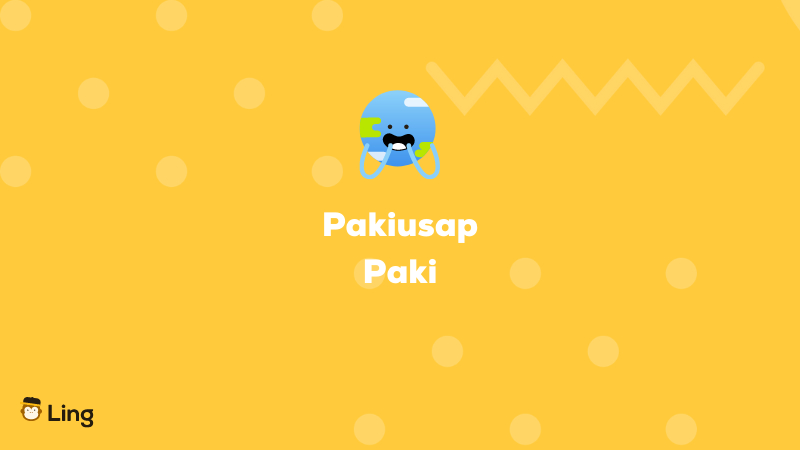Have you noticed that Filipinos say po and opo all the time? It proves how incredibly polite and respectful they are. Today, we’ll learn about the common Tagalog polite words and how you can use them during your interactions with the locals.
Why would you learn the Tagalog language? Isn’t it to communicate with Filipinos? In communicating with the locals, you need to build strong connections. It’s important to convey your message clearly and, most importantly, accurately. You can do this by first learning how to sound and speak politely. Let’s get started!
Common Tagalog Polite Words
The Filipino/Tagalog word for polite is magalang while politeness is pagiging magalang. Sounding polite in the Tagalog language isn’t that hard. You have to learn a few words, and it will go a long way.
Remember that when you’re visiting the Philippines as a foreigner, respecting the people, culture, and language reflects who you are. Here is a list of Tagalog polite words to help you in speaking Filipino/Tagalog politely:

1. Po / Ho And Opo / Oho
When you talk to a Filipino, it’s impossible not to hear po and opo. These two words are the easiest way to sound polite in Tagalog. They are used mainly when talking to elders and people of authority.
You can just literally add po or ho in any phrase to sound polite. The word ho is an informal variation of the word po, so you can choose it interchangeably, and the meaning won’t change. The Tagalog word opo and oho can also be translated as yes in English.
However, this custom is infrequently followed in several areas, particularly in the Visayas and Mindanao regions. This is due to a little variance in customs and traditions created by the Philippines’ geographical location.
Example Sentence:
- Salamat po. / Salamat ho – Thank you.
- Opo, kumain na po ako. / Oho, kumain na po ako. – Yes, I already ate.

2. Maaari (May/Can)
The next Tagalog polite word you will learn is maaari or may or can in English. This word is used in formal situations like school, books, and news. You’ll seldom hear this in a casual conversation because this word sounds way too formal, but native Tagalog speakers still use it in their daily conversations.
Example Sentences:
- Maaari mo ba akong tulungan? – Can you help me?
- Maaari ba akong humingi ng pabor? – May I ask for a favor.

3. Puwede (May/Can)
The Filipino polite word puwede is used the same way as maaari, but this is more casual. You can hear it in casual conversations. Most Filipino people use this when they are asking for favors or anything from a person.
Example Sentences:
- Puwede ko bang makuha ang iyong numero? – Can I get your number?
- Puwede ko bang hiramin ang iyong aklat? – May I borrow your book?

4. Pakiusap / Paki (Please)
Another Tagalog polite word that Filipinos use is pakiusap or paki. The English word please in Tagalog is translated to pakiusap. In spoken language, the shortened version of pakiusap is paki + the root word of the verb. On the other hand, the word pakiusap is often used in formal situations and documents.
Example Sentences:
- Pakitapon ang basura sa tamang tapunan. – Please throw your trash in the proper trash bin.
- Pakiusap, maghugas ng kamay bago kumain. – Please wash your hands before eating.
Tagalog Polite Words For Addressing Someone
Aside from the polite Tagalog words mentioned above, you can also use terms to address someone in a polite manner. This is something that Filipinos are known for.
You can also learn more Tagalog with the Ling app. It is an effective language app that helps you learn 60+ languages easily. It’s totally free to use, and you can get it from Google Play and App Store. For now, let me give you a list of words on how to address someone politely:
Sila / Nila / Inyo
These words are called panghalip in Tagalog or pronouns in English, but they are all in plural form. One interesting aspect of the Filipino/Tagalog language is that these pronouns are used even if they refer to only one person. This is a way of politely addressing someone. You may look at the example sentences below, including the example situations where they can be used.
Example Sentences:
- When talking on a phone or personal: Sino po sila? – Who is this?
- When asking a customer: Ano po ang kailangan nila? – What do you need?
- When giving someone in authority a gift: Para po ito sa inyo. – This is for you.
Ate / Kuya
The Tagalog words ate and kuya literally mean older sister and older brother in English. This is a form of respect for older people that isn’t common in other countries. These words can also be used when talking to a stranger in informal situations such as on the streets, in public vehicles, and in public areas. You can refer to the sample sentences below.
Example Sentences:
- Talking to older brother: Kuya, tawag ka ni Mama. – (Older brother), Mom is calling you.
- Talking to older sister: Ate, pakitulungan naman ako sa aking takdang-aralin. – (Older sister), please help me with my assignment?
- Talking to a stranger: Ate, puwede po bang magtanong? – Miss, can I ask a question?
- Talking to a driver: Kuya, pakibaba po ako sa kanto. – Sir, please drop me on the street corner.
Tita / Tito
The Tagalog words tito and tita can also be used in two different ways. The first one is for your aunt and uncle while the second one is for your friends or partners’ parents as long as they aren’t married yet.
When they get married, some people switch to calling them mama/nanay/’nay and papa/tatay/’tay. This is a form of politeness and respect towards them even if they are not blood-related. That’s how they usually address them in the Philippines.
Example Sentences:
- Aunt: Tita, puwede ba akong matulog sa inyo ngayong gabi? – (Auntie), can I sleep in your place tonight?
- Uncle: Tito, puwede mo ba akong turuan kung paano magbisikleta. – (Uncle), can you teach me how to ride a bike?
- Mother of friend/girlfriend or boyfriend: Tita, puwede ko bang makausap ang inyong anak? – (Auntie), may I speak with your son/daughter?
- Father of friend/girlfriend or boyfriend: Tito, puwede ko bang yayain sa labas si Jane? – (Uncle), may I invite Jane outside?
Sir / Ma’am
Many foreigners working with Filipinos can testify that Filipinos are used to calling their bosses “Ma’am” and “Sir.” Even if they are almost at the same rank as these people, Pinoys are used to addressing them politely by using “Ma’am” and “Sir” and even “Boss.” For Filipinos, this way of addressing their bosses is part of their values, and it’s hard for them to call their colleagues casually.
Example Sentences:
- Sir, puwede po ba akong umuwi nang maaga ngayon? – Sir, can I leave early today?
- Ma’am, nakapaghanda na po ako para sa pulong mamaya. – Ma’am, I’m already prepared for the meeting later.
How To Sound Polite In A Letter Or E-mail In Tagalog?
- Start with greetings (pagbati). You can check out the blog about Tagalog greetings to learn more.
- You can also include the receiver’s name in the greetings, so put the right honorific.
- Ginoo – Mr.
- Ginang. – Mrs.
- Binibini – Ms.
- Ginoo – Mr.
- Use formal forms of the words when writing the body of the letter. Do not use Tagalog slang or informal words.
- For the closing or ending of the letter or an e-mail, you may use different polite expressions such as the following:
- Gumagalang, Lubos na gumagalang – Respectfully / With respects
- Sumasaiyo/Lubos na sumasaiyo – Yours sincerely
- Gumagalang, Lubos na gumagalang – Respectfully / With respects
- Lastly, send an email at the right time. Do not send an email or letter first thing in the morning or last minute at night, especially if it’s work-related. This crucial advice may come in handy the next time you need to write an essay in Tagalog and send it by email.
Most Basic Tagalog Phrases In Polite Form
After learning the Tagalog polite words, here are some important phrases in Filipino in their polite form. These are the basic Tagalog phrases that you must learn before going to the Philippines so that you can at least get by while going around the country and talking with the locals:
| English | Tagalog | Polite Form |
|---|---|---|
| Yes | Oo | Opo |
| No | Hindi | Hindi po |
| I apologize / I’m sorry | Paumanhin / Pasensya na | Pasensya na po / Paunmanhin po |
| Excuse me | Paumanhin / Padaan | Paumanhin po / Makikiraan po |
| Thank you very much | Maraming salamat | Maraming salamat po |
| Good day! | Magandang araw | Magandang araw po |
| Good morning! | Magandang umaga | Magandang umaga po |
| Good evening! | Magandang gabi | Magandang gabi po |
| Good afternoon!/Good noon! | Magandang tanghali | Magandang tanghali po |
| Good afternoon! | Magandang hapon | Magandang hapon po |
| Good night./Good evening. | Magandang gabi | Magandang gabi po |
| How are you? | Kumusta ka? | Kumusta po kayo? |
| Excuse me, can I buy this? | Pabili | Pabili po |
| Can you give a discount? | Bigyan mo ako ng discount | Pwede mo ba akong bigyan ng discount |
| Where can I ride a jeep? | Saan ang sakayan ng jeep? | Saan po ang sakayan ng jeep? |
| Where’s the shopping center? | Saan ang pamilihan? | Saan po ang pamilihan? |
| How much is the train fare? | Magkano ang ticket sa MRT? | Magkano po ang ticket sa MRT? |
| Is Boracay beautiful? | Maganda ba ang Boracay? | Maganda po ba ang Boracay? |
| Please help me. | Tulong | Tulungan niyo po ako |
| Please call the doctor. | Tumawag ka ng doktor | Pakitawagan ang doktor |
| How can I get to the hotel? | Paano ako makakarating sa hotel? | Paano po ako makakarating sa hotel? |
| Can I book two rooms? | Puwede ba along mag-book ng dalawang kuwarto? | Puwede po ba along mag-book ng dalawang kuwarto? |
| Could you recommend a nice restaurant near here? | Ano and magandang kainan na malapit dito? | Maaari ka bang mag rekomenda ng kainan malapit dito? |
| What food can you recommend? | Ano ang mairerekomenda ninyong pagkain? | Ano po ang mairerekomenda ninyong pagkain? |
| May I have a glass of water? | Pahingi ng isang basong tubig | Pwede ba akong makahingi ng isang basong tubig? |
| May I have the bill? | Kukunin ko na ang bayarin/bill | Maaari ko bang makuha ang bayarin/bill? |
| May I have a receipt? | Kukunin ko na ang resibo | Pwede ba akong humingi ng resibo? |
| Can I pay with a credit card? | Credit card ang gagamitin kong pambayad | Maaari po ba along magbayad gamit ang credit card? |
| Do you accept credit cards? | Tumatanggap ba kayo ng credit card? | Tumatanggap po ba kayo ng credit card? |
| What time is it? | Anong oras na? | Ano pong oras na? |
| Where’s the shopping center? | Saan ang pamilihan? | Saan po ng pamilihan? |
| When does it open? | Kailan ito mag bubukas? | Kailan po ito magbubukas? |
| I would like to return this. | Gusto ko itong ibalik | Maaari ko ba itong ibalik? |
| May I try it on? | Susukatin ko ito | Pwede ko ba itong sukatin? |
| How much is this? | Magkano ito? | Magkano po ito? |
Why Politeness Is Important In The Philippines
Being respectful, especially to elders, has always been part of Filipino culture. Filipinos are taught how to talk to an older person or people of authority using polite Filipino expressions and words at a young age. But being polite isn’t just for children and younger people. Filipinos also use polite words when talking to their colleagues, bosses, customers, and even strangers.
The Philippines is such a beautiful country, and Filipinos are extraordinary. But once you land there, being disrespectful is something that you would avoid because respect is a big deal in their culture.
Being a foreigner is not an excuse for learning how to speak politely. Of course, they will understand if you don’t know how to sound polite, but it wouldn’t hurt to learn, especially for language enthusiasts. It’s pretty easy anyway, so yeah, I hope these common Tagalog polite words will help you make an impression with Filipinos around the world.
Updated By: Jefbeck
































































